As the sun set on the 60s and a new decade dawned, it was clear to the Grateful Dead and Jerry Garcia in particular that careering down the old psychedelic trail was proving disastrous to their finances. Their meandering MO established underground credentials, but preaching to the converted didn’t fill the offering bowl.
In February 1970, Garcia and lyricist Robert Hunter got to work on a suite of songs composed at speed in a shared house in Marin County. The results were freshly minted evocations of a mythic, folkloric narrative that required more structure than they’d anticipated.
Enthused by Crosby, Stills And Nash’s close harmony singing, the Dead were rehearsed into submission by Garcia, with guitarist Bob Weir and bassist Phil Lesh lashed to the microphone on Uncle John’s Band and High Time, the latter propelled by Garcia’s recent mastery of the pedal steel guitar and adding a dark country melancholy to songs about the doomed and the desperate.
While the Dead were never going to be an acid Everly Brothers, they found they could be a surrogate Bakersfield-style band, something tapped into on Dire Wolf’s sepia-tinted blue-collar tale of a card game with the devil and the coal-dust misery of Cumberland Blues.
By the wayside they glanced back at the Altamont fiasco on New Speedway Boogie, on which Pigpen’s throaty interjection brought to mind the danger associated with biker gangs who attached themselves to hippie rock groups.
“They’re capable of doing a lot of crazy things and we just stay out of their way” was Garcia’s view. Meanwhile, Hunter pulled them towards the dark side on deathbed vigil Black Peter and the metallic blues of Easy Wind, before the Dead emerged into the sunshine of the ghost train and cocaine anthem Casey Jones.
The original album, remixed and remastered to perfection, doesn’t now include any out-takes, no Mason’s Children, but it does come with a complete contemporary concert from 1971 that includes the new material and pieces from follow-up album American Beauty, while unveiling live versions of the epic songs Bertha, Wharf Rat and Weir’s bible-bash Greatest Story Ever Told that appeared on his debut solo record Ace.
John Phillips’s treacherous Me And My Uncle and Kris Kristofferson’s Me And Bobby McGee were vehicles driven by Weir’s newfound position as the band’s country cat.
Fifty years later, this package finds the Dead at their most fertile and inventive.

